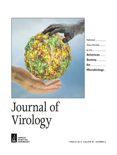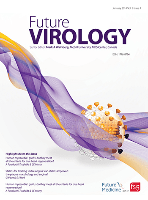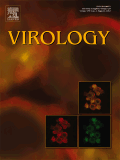
Journal of Virology
Scope & Guideline
Unraveling the Mysteries of Virology
Introduction
Aims and Scopes
- Viral Pathogenesis and Host Interaction:
Research focused on understanding how viruses cause disease and interact with host cells, including mechanisms of immune evasion, replication dynamics, and viral persistence. - Viral Structure and Function:
Studies investigating the structural biology of viruses, including the role of viral proteins in entry, replication, and assembly, as well as the development of vaccines and therapeutics based on viral structures. - Molecular Virology:
Exploration of the molecular mechanisms underlying viral replication, transcription, and translation, including the interactions between viral and host cell factors. - Viral Evolution and Epidemiology:
Research addressing the evolutionary dynamics of viruses, their genetic diversity, and the implications for public health, including zoonotic transmissions and outbreak investigations. - Therapeutics and Vaccines:
Studies focused on the development of antiviral drugs and vaccine candidates, examining their efficacy, mechanisms of action, and potential for clinical applications.
Trending and Emerging
- COVID-19 and SARS-CoV-2 Research:
A significant surge in research related to SARS-CoV-2, including studies on viral variants, vaccine development, immune responses, and therapeutic strategies, reflecting the ongoing global pandemic. - Viral Immunology and Vaccine Development:
An increasing focus on understanding immune responses to viral infections, including the development of novel vaccines and therapeutic strategies based on viral antigens and immune modulation. - RNA Virus Dynamics and Evolution:
Emerging studies on the evolutionary dynamics of RNA viruses, particularly regarding their transmission, mutation rates, and adaptation mechanisms in response to host immune pressures. - Viral Interference and Coinfection:
Research examining the interactions between multiple viral infections (coinfections) and how they influence disease outcomes, viral replication, and immune responses. - Use of Advanced Genomic and Proteomic Technologies:
Growing application of next-generation sequencing, CRISPR technologies, and proteomics to dissect viral biology and host interactions at unprecedented resolution.
Declining or Waning
- Traditional Virology Techniques:
There seems to be a declining emphasis on classical virology methods, such as plaque assays and basic viral culture techniques, as newer technologies like high-throughput sequencing and advanced imaging methods gain prominence. - Research on Non-Pathogenic Viruses:
Studies focusing on non-pathogenic or benign viruses may be waning, as the urgency surrounding viral pathogens, especially post-COVID-19, drives research towards more impactful topics. - Basic Host-Pathogen Interaction Studies:
There is a noticeable shift away from purely observational studies of host-virus interactions towards more mechanistic studies that inform therapeutic and vaccine development.
Similar Journals

Advances in Virology
Unleashing Innovation in Viral ScienceAdvances in Virology, an esteemed journal published by HINDAWI LTD, serves as a pivotal platform for cutting-edge research in the field of virology and infectious diseases. With its ISSN 1687-8639 and E-ISSN 1687-8647, the journal has been a significant contributor to the scientific community since its initiation as an Open Access resource in 2009, allowing researchers from around the globe to access groundbreaking findings without barriers. Operating out of the United States and recognized for its commitment to high-quality research, the journal's relevance is underscored by its ranking in the Q3 category for Infectious Diseases and Q4 for Virology as of 2023. The time frame of publications spans from 2009 to 2024, reflecting a continuous commitment to exploring the evolving landscape of virology. This journal not only promotes the dissemination of novel insights and methodologies but also fosters collaboration and innovation within the scientific community, making it an invaluable resource for researchers, professionals, and students alike.

Journal of Virus Eradication
Empowering research for a virus-free future.Welcome to the Journal of Virus Eradication, a premier publication dedicated to advancing the field of virology and infectious disease research. Published by MEDISCRIPT LTD, this journal provides a vital platform for sharing cutting-edge research findings in key areas including epidemiology, immunology, and public health. With an impressive classification of Q2 in Epidemiology and Infectious Diseases for 2023, this journal exemplifies a commitment to high-quality scholarship and impactful research. The Journal of Virus Eradication is instrumental in disseminating knowledge that tackles viral threats, contributing to global health initiatives aimed at virus containment and eradication. Researchers, professionals, and students alike will find this journal an invaluable resource, making significant contributions to the scientific community and society at large.

ACTA VIROLOGICA
Pioneering knowledge in viral diagnostics and treatment.ACTA VIROLOGICA, a key journal in the field of virology and infectious diseases, is published by FRONTIERS MEDIA SA in Slovakia, serving the global scientific community with groundbreaking research since its inception in 1957. This esteemed journal, identified by ISSN 0001-723X and E-ISSN 1336-2305, provides a platform for rigorous peer-reviewed articles that contribute significantly to our understanding of viral pathogens and their implications in medicine. Positioned within the Q3 category for both Infectious Diseases and Miscellaneous Medicine, and a Q4 category for Virology in 2023, ACTA VIROLOGICA offers crucial insights into the evolving landscape of virology research. With its robust accessibility options, this journal appeals to a diverse readership, including researchers, healthcare professionals, and students, fostering a collaborative environment to advance the field of virology. The editorial objective is to enhance the catalog of knowledge pertaining to viruses, promoting innovative approaches in prevention, diagnostics, and treatment. Located at AVENUE DU TRIBUNAL FEDERAL 34, LAUSANNE CH-1015, SWITZERLAND, ACTA VIROLOGICA continues to be a vital resource in the collective efforts to combat viral disease challenges.

Frontiers in Virology
Pioneering Discoveries in Viral PathogenesisFrontiers in Virology, published by FRONTIERS MEDIA SA, is an innovative open-access journal dedicated to advancing the understanding of viral biology, pathogenesis, surveillance, and control strategies. With the rapid evolution of viral threats, this journal serves as a critical platform for researchers, professionals, and students to disseminate and access high-quality research, reviews, and perspectives in virology. The journal places a strong emphasis on interdisciplinary approaches, promoting collaborative efforts that drive breakthroughs in the field. While the specific impact factor and H-index details are currently unavailable, Frontiers in Virology is committed to rigorous peer review and integrity in scientific publishing. Authors and readers will benefit from the extensive reach provided by open access, making groundbreaking insights available to a global audience, thus contributing significantly to the ongoing dialogue in virology and public health.

Journal of Clinical Virology Plus
Connecting knowledge to enhance public health strategies.The Journal of Clinical Virology Plus, published by Elsevier, is an essential resource for researchers and professionals in the fields of virology and infectious diseases. Launched in 2021, this journal aims to bridge the gap between clinical research and application, fostering a deeper understanding of viral pathogenesis, diagnostics, and therapeutic strategies. With an ISSN of 2667-0380, this open-access journal brings cutting-edge findings to the global scientific community, facilitating the rapid dissemination of knowledge critical for advancing public health. Positioned in the Q3 category for both Infectious Diseases and Virology in 2023, its ranking reflects its growing influence and relevance in the academic landscape. The journal strives to support innovative research, collaborative studies, and comprehensive reviews that address contemporary challenges in clinical virology. As it converges through the years from 2021 to 2024, Journal of Clinical Virology Plus aims to be a central hub for vital discussions and breakthroughs in this dynamic field.

ANTIVIRAL RESEARCH
Advancing the Frontiers of Antiviral ScienceANTIVIRAL RESEARCH, published by Elsevier, stands at the forefront of the study of antiviral agents and therapy, with a dedicated focus on advancing the understanding of viral infections and their mechanisms. The journal is recognized within the top tier of academic publications, belonging to the prestigious Q1 category in both Pharmacology and Virology as of 2023, ranking 12th out of 313 in Pharmacology and 11th out of 80 in Virology according to Scopus metrics, reflecting its significant impact in the field. With a long-standing history since its inception in 1959, it continues to serve as an essential platform for researchers and health professionals alike, sharing critical findings that drive innovation in antiviral therapeutics. Although it does not currently offer open access options, the journal’s rigorous peer-review process ensures that every published article meets high academic standards, providing invaluable insights for those dedicated to enhancing public health through virology research.

ARCHIVES OF VIROLOGY
Championing rigorous research in viral science.Archives of Virology is a prestigious academic journal dedicated to the field of virology, published by Springer Wien. Established in 1975, this journal has been a crucial platform for disseminating innovative research findings and advancements in the understanding of viral diseases and their impact on human health. It holds a notable position in the academic landscape, with a 2023 impact factor placing it in Q2 within the field of Medicine (miscellaneous) and Q3 in Virology. Its Scopus ranking within the Virology category further underscores its relevance, with a notable percentile of 45th. Although it does not provide Open Access options, the journal's rigorous peer-review process ensures the highest quality of published work, making it an essential resource for researchers, professionals, and students aiming to stay updated in the rapidly evolving field of virology. For those committed to advancing their understanding of viruses and viral diseases, Archives of Virology is a vital scholarly resource.

Future Virology
Unveiling the Future of Viral ScienceFuture Virology, published by Future Medicine Ltd, is an essential journal dedicated to advancing the understanding of virology in the contemporary scientific landscape. With an ISSN of 1746-0794 and an E-ISSN of 1746-0808, this journal serves as a platform for researchers and practitioners in the field to publish high-quality, peer-reviewed articles that explore novel discoveries, innovative therapeutic strategies, and the implications of viral research on global health. Operating from the United Kingdom and maintaining a commitment to rigorous scientific inquiry, Future Virology is categorized in the Q4 Quartile for Virology according to the latest Scopus rankings, with a position of Rank #48/80 and a percentile of 40th in the Virology category. Although it currently does not offer open access, the journal strives to disseminate critical insights that benefit a wide range of professionals, researchers, and students engaged in virology and related fields. By bridging the gap between basic research and practical applications, Future Virology plays a crucial role in fostering innovation and collaboration in the ever-evolving virology landscape.

VIROLOGY
Pioneering Research in Virology and PathogenesisVirology, published by Academic Press Inc. Elsevier Science, is a prominent journal dedicated to advancing the knowledge and understanding of viral biology and pathogenesis since its inception in 1955. With a distinguished impact factor and recognized as a Q2 journal in the field of Virology for 2023, it ranks 38 out of 80 in the Scopus database for Immunology and Microbiology, placing it in the 53rd percentile among similar publications. This esteemed journal provides a platform for groundbreaking research, critical reviews, and comprehensive studies that contribute to our global understanding of viruses and their impact on health and disease. Although currently not an open-access journal, it remains accessible to a wide audience of researchers, professionals, and students who are keen to explore the latest advancements in virological research. The journal's scope encompasses a diverse range of topics, ensuring that it serves as an essential resource for anyone engaged in virology and related biomedical fields.

VIRAL IMMUNOLOGY
Innovating research to combat viral infections through immunology.Viral Immunology, published by Mary Ann Liebert, Inc, stands as a prominent journal dedicated to advancing the understanding of the interplay between viral infections and host immune responses. With a strong focus on immunology, molecular medicine, and virology, the journal provides a platform for the dissemination of high-quality research findings and innovative methodologies that could shape the future of these critical fields. Although it currently holds a Q3 rating across its relevant categories and a respectable ranking within the Scopus database, Viral Immunology continues to strive for excellence with a commitment to publishing influential research that informs both academic and clinical practices. The journal accepts submissions in various formats—original research, reviews, and commentaries—catering to a diverse readership that includes researchers, professionals, and students engaged in the biological and medical sciences. Readers can anticipate insightful articles that address urgent challenges in immunological responses to viral infections, paving the way for new therapeutic strategies and public health initiatives.